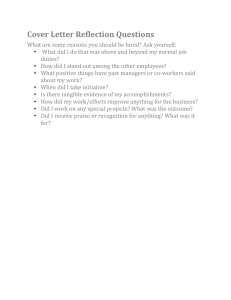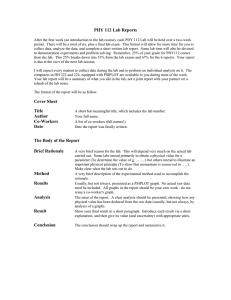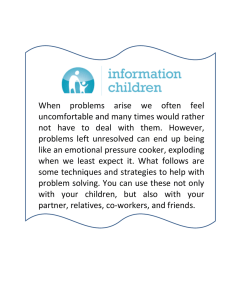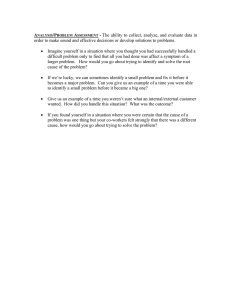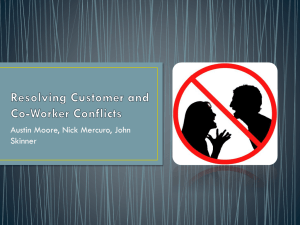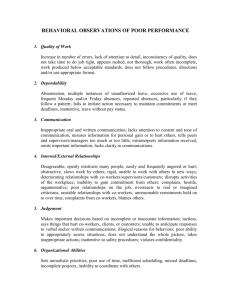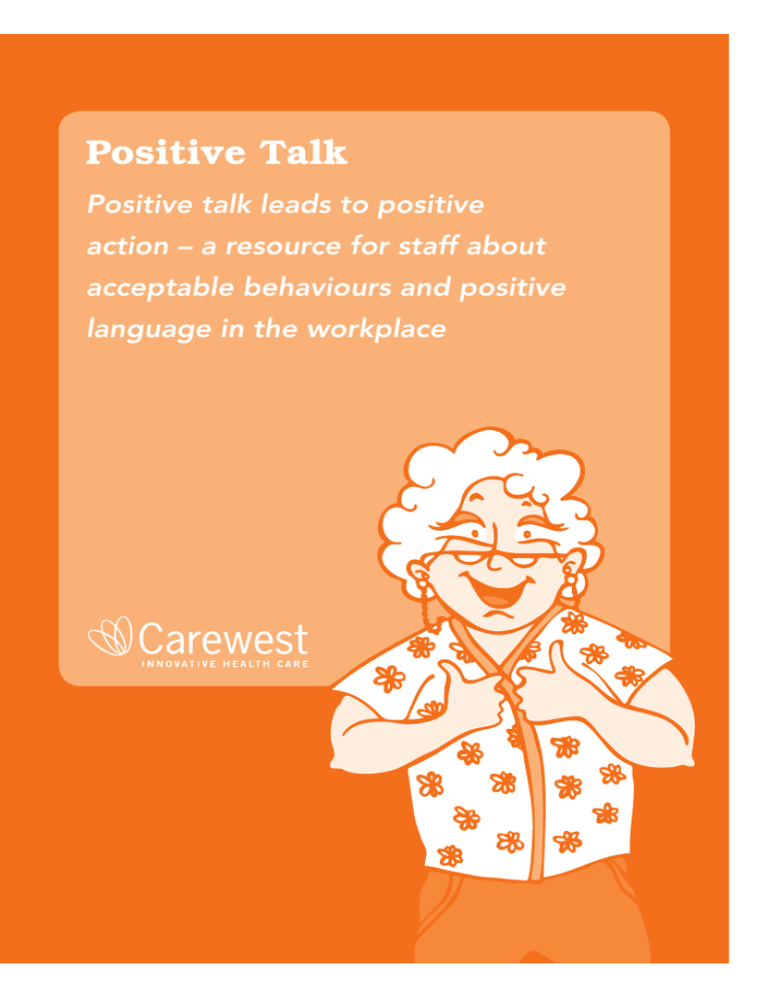
Positive Talk
Positive talk leads to positive
action – a resource for staff about
acceptable behaviours and positive
language in the workplace
Positive Talk is a series intended to help you
communicate more effectively with the people
around you – your co-workers, residents, clients
and their families. This module highlights some
common communication scenarios that occur
when speaking with people you meet each and
every day – your co-workers. It provides several
examples of appropriate and inappropriate
responses. It also touches upon the importance
of positive communication in everything we
do and offers some basic communication
techniques you can follow.
2
Communicating
with your co-workers
At Carewest, the relationship you have with your co-workers is often as
important as the one you have with the residents and clients you care
for. As part of your role, it is important to be a positive and professional
influence in the workplace – even if this behaviour hasn’t yet been
adopted by all your co-workers.
Being aware of how you communicate with your co-workers, residents,
clients and families can ensure those relationships remain positive
and constructive.
You can use this guide as a reference when handling various types of
interpersonal situations in the workplace or as a learning guide for your
own personal growth and development.
In health care, there are many different occupations working under one
roof and we work towards a common goal – excellent care, customer
service and communication for our residents, clients and families.
We need to remember we are all part of a team, working together to
make sure we can offer the best care possible.
Maintaining positive relationships with your co-workers, whether they
work right next to you or on a different unit altogether, is an important
part of meeting those goals.
The following scenarios highlight some of the common situations that
can occur everyday in the workplace and offer suggestions to help you
handle them more effectively.
3
1. Scenario
Customer Service
A resident is ill with a dry cough. A nursing
attendant starts her shift and notices
him coughing.
Appropriate response
While some may have waited until Mr. Smith
pressed the call bell, this nursing attendant
anticipated the resident’s needs and went
above and beyond to bring him
something to make him feel better.
Inappropriate responses
“Good morning Mr. Smith. I heard
you coughing and I thought I would
bring you some tea to soothe
your throat.”
• Ignoring him
• Waiting until he pressed the
call button
• Taking a break in hopes someone
else would deal with him
• Asking him to be quiet
4
2. Scenario
Punctuality
Several employees are consistently coming
into work late and comment on one staff
member’s ability to always be on time.
Appropriate response
Being on time and ready to work is part of
your job. If you know you have to work early,
make sure you get the rest you need to be
fresh the next day.
“I always make sure to leave the
house a little earlier, especially in
poor weather, because I know I
need to be here at 0700 hrs.”
Inappropriate responses
• Coming in late – even if it’s only
five minutes
• Leaving early – even if it’s only
five minutes
• Coming in on time and taking
15 minutes to put on makeup
in the bathroom
5
3. Scenario
Respect
Two staff members are having a conversation while
providing care. They are speaking a language other
than English. A co-worker overhears them.
Appropriate response
Apologize for being unaware and make
sure that when you are on the job, English
is the only language you are speaking
– unless you are speaking the language of
a client or resident in an attempt to
Inappropriate responses
better communicate with them.
• “It’s not my fault, I don’t know
I’m sorry. We are always supposed
English well enough.”
to include the resident in our
• “I was having a private
conversations and speak English
conversation.”
at work. I will make sure to do that
• “Stop eavesdropping.”
from now on.
• “If you don’t like it, go
somewhere else.”
6
4. Scenario
Teamwork
You’ve finished a long and busy day. Just before
leaving, one of your co-workers approaches you
with a problem.
Appropriate response
Even though you have technically finished your
shift, take steps to help your co-worker find what
he or she needs. And if you do it with a smile on
your face, you can be sure they will be there to
help you when you need it.
Inappropriate responses
“Of course! Let me show you where
• “I’m done for the day.”
you can find the clean blankets.”
• “Ask someone else.”
• “Fine, I’ll help you. But you’re
going to make me late.”
• “Find it yourself.”
7
Other common scenarios
When you encounter
difficulty or need further
guidance, always ask for
help when you need it.
When someone
approaches you for help,
always take steps to help
that person in whatever
way you can.
Never assign blame or make
assumptions about others
when trying to solve
a problem.
Say: “Yes, this is what I
can do” instead of focusing
on what you cannot do.
Tips for speaking positively
• Eliminate the word “no” from your vocabulary. Instead of
saying, “I don’t know,” “I don’t like that idea,” and “it’s not
my responsibility,” try saying “here is what I know,” “let’s try
this” and “this is what I can do”.
• If you don’t know the answer or are stuck on a problem, find
someone who can help.
• Treat everyone with respect – the way you would like to
be treated.
• Keep your body language in check. Make eye contact,
smile and listen attentively. Remember, 93 per cent of
communication is non-verbal.
8
Making Decisions
No matter what your job description, you most likely have to make
decisions on the job every day.
You may find most of your decisions were appropriate when applied to
the situation. You may also find some decisions lead to questions and
even conflict.
The following scenarios highlight some of the common situations that
can occur when making decisions, what to do in those situations and
what not to do.
9
5. Scenario
Initiative
After months of use, the staff bulletin board has
started to look very messy. Two co-workers stop to
comment on how it looks.
Appropriate response
Take pride in your work, initiate your own
solutions and clean up the bulletin
board. Take ownership of the
Inappropriate responses
problem and come up with ways to
• “Yeah, that bulletin board
fix it, rather than wait for someone to
looks terrible. Why doesn’t
fix it for you.
someone clean it?”
“You’re right. Why don’t you help me
and we can just clean it
up ourselves.”
• “I wish someone would
clean those bulletins. Or
throw the whole thing out.”
• “I think it looks fine.”
• “It’s not my job.”
10
6. Scenario
Safety
Someone forgets to dispose of a needle because
they didn’t take the portable sharps container
with them.
Appropriate response
If you made a mistake, take responsibility
for your actions. Apologize, take steps to
correct your error and to ensure it doesn’t
happen again.
“I was so busy that I didn’t take the
portable biohazard container with
me. I was distracted and accidentally
left the needle on the table. Let me
dispose of it properly. It won’t
happen again.”
Inappropriate responses
• “I don’t know.”
• “It wasn’t me.”
• “I was too busy.”
• “Why does it matter?”
11
7. Scenario
Support
A staff member is working through her second day on
the job and is moving slowly and with care. Two
co-workers are impatient and start talking about
making life hard for their new co-worker.
Appropriate response
Working in a busy environment can pose many challenges. We
have to remember to welcome all new employees and relief staff.
While maybe working slower than you, your new co-workers are an
important part of the team in delivering
excellent resident and client care. Be
Inappropriate response
patient because they will one day be
• “Let’s not talk to her and
making your job easier.
make her uncomfortable.”
“Considering she’s only on her second
• “Let’s ask her why she’s
day, we may want to give her more time.
moving so slowly.”
Do you remember how slow we were
•
“Let’s not help her in any
when we first started?”
way so she leaves.”
12
Non-Productive Behaviours
Sometimes we don’t speak to or address our co-workers in the
most respectful manner. Sometimes we don’t show up to work
on time or sometimes we find ourselves talking in a negative
manner, whether it is about a fellow co-worker or your job. Here
are some examples of things you should try to avoid to ensure
a healthy and productive work environment.
Examples of what not to do:
• Criticizing another co-worker
• Coming to work late
• Complaining about your job
• Comparing one staff member to another
• Competing for attention
• Telling families we are short-staffed and overworked
Avoid:
• Always saying no, if you can
• Ignoring instructions
• Assigning blame
• Swearing
• Yelling at staff, residents or clients
• Gossiping or telling secrets
13
Acceptable Behaviours Reference Guide
When in doubt, check these pages if you are unsure of some aspect of
behaviour in the workplace.
Accountability
1.
2.
3.
4.
5.
6.
7.
8.
9.
Accepts responsibility for actions
Meets Carewest expectations
Completes assignments and finishes what is started
Follows standard operating principles and professional standards
Comes to work on time and ready to work
Keeps knowledgeable and up-to-date
Asks for help when needed
Does what they say they will
Takes responsibility for the decisions made and the results that follow
Communication
1.
2.
3.
4.
5.
6.
7.
Demonstrates passion and enthusiasm for work
Participates in and encourages discussion
Actively listens and questions to gain understanding
Communicates clearly and concisely in written and oral form
Shares information and ideas, gives and asks for feedback
Remains approachable and positive
Helps others solve problems and is approachable and positive
Conflict Resolution
1. Remains calm
2. Has a willingness to solve problems
3. Participates in creating a positive environment
4. Prepares for the conversation and starts with the facts
5. Focuses on the behaviour, not the person
6. Avoids making judgments and assumptions
7. Removes blame
8. Goes to the source of the problem
9. Determines the other person’s point of view
10. Listens with the intent to understand
11. Asks questions for clarification
12. Works on solutions together to agree on a plan
13. Follows up
Customer/Client Focus
1.
2.
3.
4.
5.
6.
14
Delivers exceptional client care
Creates a positive image for Carewest among clients, families and visitors
Treats each client with respect and concern
Anticipates client needs and promptly responds accordingly
Listens and asks questions to understand client needs
Involves clients and/or families where possible in the solution
7. Owns the problem, does not “pass the buck” and seeks help if unsure
8. Says “yes, here’s what I can do”
9. Generates creative ideas and fresh approaches to customer concerns
10. Takes initiative to deliver better service
11. Seeks ways to protect the work environment and improve safety of
clients and fellow employees
12. Creates positive socialization opportunities for residents and clients
Decision Making
1. Identifies, defines and considers all important issues before making
a decision
2. Remains open to new information and changes direction if the
situation warrants it
3. Makes effective and timely decisions
4. Involves others in the decision, especially if it affects their work
5. Identifies and validates solutions
6. Looks for alternatives and evaluates the potential risk
7. Contributes creative solutions and suggestions
8. Implements the solution and follows up
9. Supports others in their decisions
Professionalism
1. Represents Carewest in a positive manner
2. Leads by example, acts as a role model and holds self and others to
the highest professional and technical standards
3. Treats people with respect
4. Takes pride in their work
5. Accepts change and setbacks in stride
6. Understands and has the ability to interpret policies and procedures
7. Displays personal strength and composure in stressful situations
8. Looks for ways to make things better
9. Prioritizes by putting first things first
Respect
1.
2.
3.
4.
Listens and considers others’ ideas and information
Shares ideas and information in a timely manner
Is honest and straightforward with co-workers and clients
Treats all people fairly, with respect and recognizes the diversity in
employees
5. Anticipates the needs of others
6. Offers to help
7. Small courtesies and kindness given freely
8. Makes and keeps promises
9. Exercises discretion in handling sensitive and confidential information
10. Communicates in an open and honest manner
11. Provides encouragement to teammates
15
In support of our Carewest Frame of Reference,
our Philosophy of Care is:
“To provide our residents and clients with
quality care in safe, comfortable and
supportive environments.”
The Guiding Principles to the Philosophy include working together to:
• Preserve and promote dignity through respectful,
individualized approaches to care;
• Provide kind and compassionate care and service;
• Foster supportive relationships between all staff,
clients, families and communities;
• Foster an environment of learning to promote
excellence in care and service.
© Carewest October 2014. All Rights Reserved.

